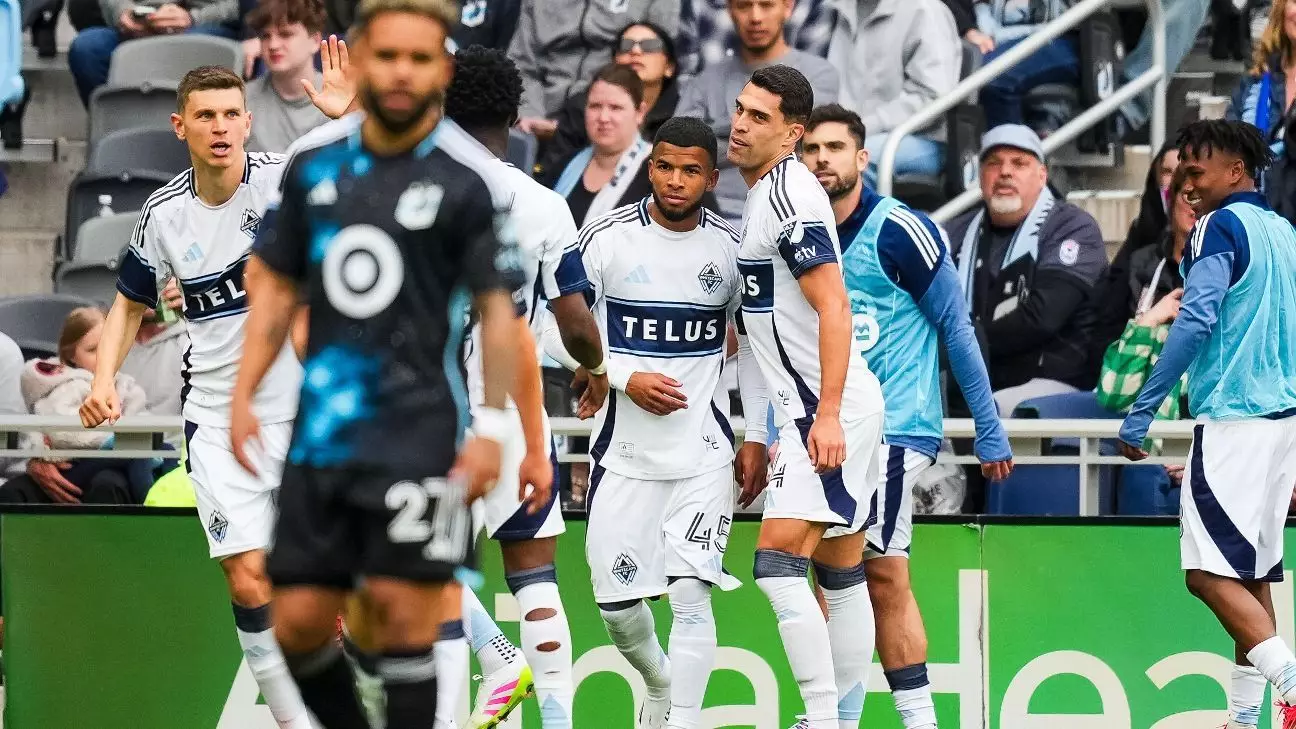This past Sunday, the Major League Soccer (MLS) community was thrust into the spotlight following a contentious incident during the match between Minnesota United FC and the Vancouver Whitecaps. With the stakes high and emotions soaring, the 95th minute saw a verbal confrontation that could potentially tarnish the reputation of the league, sparking ongoing discussions about discrimination in sports. If this incident serves as a mirror reflecting the larger societal issue, it demands a thorough examination not only of what was said but also of how the league has responded to recurrent discrimination allegations over the past years.
In that pivotal moment, tensions escalated between Minnesota’s Joseph Rosales and Vancouver’s Emmanuel Sabbi. As emotions flared on the pitch, it was Sebastian Berhalter from the Whitecaps who escalated the situation further by directing gestures toward Rosales. The referee, Drew Fischer, seemed to be navigating turbulent waters; although he employed the league’s Non-Discrimination Policy protocol, it swiftly became apparent that verification of what transpired was a significant hurdle. He opted not to sanction Rosales, which again exposes the difficulties in addressing discriminatory conduct effectively during live matches. This lack of immediate accountability raises important questions about the robustness of league protocols.
The League’s Response: A Step Toward Accountability?
MLS has expressed its commitment to investigate the incident, pledging to conduct a comprehensive review. This is a commendable initiative; however, the question arises—will this be enough to change the culture within the league? Statements from both the league and Minnesota United indicate a strong stance against any forms of harassment or discrimination. Particularly notable is Minnesota United’s declaration condemning such behavior, affirming that these attitudes have “no place in our sport.” This is an important statement, but it also reflects the all-too-frequent lip service given to these issues without substantive change.
Unfortunately, history shows that MLS has grappled with various incidents of discriminatory behavior among players, raising concerns about whether the measures taken are more reactive than proactive. Previous cases, such as the suspensions of players like Kai Wagner and Dante Vanzeir, emphasize a concerning trend—that despite the league’s stated commitment to equality, incidents of discrimination continue to surface. This inconsistency undermines the league’s credibility and casts doubt on how effectively it can protect its players and maintain the integrity of the game.
Long-term Solutions: Training and Education at the Forefront
In a proactive step taken earlier, MLS and organizations like Black Players For Change have proposed a training program aimed at educating players about what constitutes unacceptable verbal behavior. This initiative is crucial for cultivating awareness among players, especially those from diverse cultural backgrounds who may not fully understand the consequences of their words or actions. This strategic move is commendable, yet it begs for consistent implementation and monitoring. Education is a powerful tool, but the league must ensure it’s not merely a checkbox exercise. A genuine commitment to education can help foster understanding and create a more inclusive environment for all.
Moreover, it’s important for the MLS community—including players, coaches, and support staff—to create a culture of accountability. There must be a collective willingness to address and discuss these issues openly. Silence only perpetuates discriminatory behavior, making it essential for every participant within the league to embrace their role as advocates for equality.
The Broader Impact: MLS’s Role in Society
The events that transpired during the Minnesota-Vancouver match serve as a microcosm of the societal challenges we face. It’s vital to remember that sports often serve as a reflection of broader social dynamics. For the MLS to be seen as a leader in promoting inclusivity, it must take firm stances against discrimination not just in words, but through consistent actions. The league possesses the unique power to influence fans, communities, and even global conversations surrounding equity and respect.
As soccer gains traction in the United States, this is a crucial moment for MLS to distinguish itself from other leagues worldwide. The potential ramifications of its actions extend well beyond the pitch, possibly impacting societal norms and expectations regarding equity and acceptance. What the league chooses to do next will not only shape its future but could also play a pivotal role in the ongoing battle against discrimination within sports at large.

